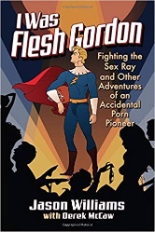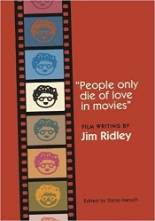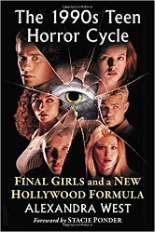 Even if you’re not a fan of the 1974 parody Flesh Gordon (and I’m not), the autobiography of leading man Jason Williams makes for an eye-opening read on the member-raising adult film industry. In I Was Flesh Gordon: Fighting the Sex Ray and Other Adventures of an Accidental Porn Pioneer, the all-American Williams (with an assist from blogger Derek McCaw) shares how he went from near-starving actor to the titular role in an instantly infamous, X-rated mainstream hit … and yet remained just outside Hollywood’s periphery. Just as intriguing as his on-set remembrances are his at-home ones, when he tiptoed around how much he should (or should not) tell his then-girlfriend about his workday — in particular, the scene in which he was mounted by a German stranger who guided him inside her when they could have gotten away with, y’know, acting. Published by McFarland & Company, the slim and breezy volume loses steam toward the end, because Williams’ follow-up film, the 1976 pornographic musical version of Alice in Wonderland, has neither the wealth of juicy stories nor the cultural impact of Flesh. It’s this summer’s bio you didn’t know you wanted to read!
Even if you’re not a fan of the 1974 parody Flesh Gordon (and I’m not), the autobiography of leading man Jason Williams makes for an eye-opening read on the member-raising adult film industry. In I Was Flesh Gordon: Fighting the Sex Ray and Other Adventures of an Accidental Porn Pioneer, the all-American Williams (with an assist from blogger Derek McCaw) shares how he went from near-starving actor to the titular role in an instantly infamous, X-rated mainstream hit … and yet remained just outside Hollywood’s periphery. Just as intriguing as his on-set remembrances are his at-home ones, when he tiptoed around how much he should (or should not) tell his then-girlfriend about his workday — in particular, the scene in which he was mounted by a German stranger who guided him inside her when they could have gotten away with, y’know, acting. Published by McFarland & Company, the slim and breezy volume loses steam toward the end, because Williams’ follow-up film, the 1976 pornographic musical version of Alice in Wonderland, has neither the wealth of juicy stories nor the cultural impact of Flesh. It’s this summer’s bio you didn’t know you wanted to read!
 The only thing unsatisfying about People Only Die of Love in Movies: Film Writing by Jim Ridley is that the author isn’t around to see it. A longtime force of nature behind the influential alt-weekly Nashville Scene, Ridley was editor when he passed away unexpectedly in 2016; this Vanderbilt University Press hardback exists as a tribute and wasn’t in the planning stages during his lifetime, but it was bound to happen, posthumously or not, for one reason: The way he put words to page was — and is — the very definition of craft. For this collection, co-worker/close friend Steve Haruch assembled nearly 100 of Ridley’s reviews — a generously representative swath that includes a defense of Jackass, a pan of Schindler’s List and liner notes for the Criterion Collection’s release of The Umbrellas of Cherbourg. My favorite piece, however, isn’t a review at all, but a long-form look back at the making and legacy of Robert Altman’s Nashville on the eve of the divisive classic’s 20th anniversary that makes a revisit immediately tempting, even if you were lukewarm on the picture. That he could do the same for works on as wide a range as Howard Hawks and Rob Zombie is indicative of his immense gift.
The only thing unsatisfying about People Only Die of Love in Movies: Film Writing by Jim Ridley is that the author isn’t around to see it. A longtime force of nature behind the influential alt-weekly Nashville Scene, Ridley was editor when he passed away unexpectedly in 2016; this Vanderbilt University Press hardback exists as a tribute and wasn’t in the planning stages during his lifetime, but it was bound to happen, posthumously or not, for one reason: The way he put words to page was — and is — the very definition of craft. For this collection, co-worker/close friend Steve Haruch assembled nearly 100 of Ridley’s reviews — a generously representative swath that includes a defense of Jackass, a pan of Schindler’s List and liner notes for the Criterion Collection’s release of The Umbrellas of Cherbourg. My favorite piece, however, isn’t a review at all, but a long-form look back at the making and legacy of Robert Altman’s Nashville on the eve of the divisive classic’s 20th anniversary that makes a revisit immediately tempting, even if you were lukewarm on the picture. That he could do the same for works on as wide a range as Howard Hawks and Rob Zombie is indicative of his immense gift.
 Two years after writing the très informative Films of the New French Extremity, Alexandra West looks closer to home with The 1990s Teen Horror Cycle: Final Girls and a New Hollywood Formula. Kicked off by the word-of-mouth phenomenon that was Wes Craven’s Scream, the dead-teenager subgenre that briefly flourished thereafter is a fascinating movement in modern pop culture, and certainly one worth studying. This McFarland release isn’t going to be the definitive word on the trend, but for now, it’s as close as we have. If you were sober through much of the Nineties, you can skip the history refresher of the introduction and somewhat redundant first two chapters, and delve right into the chronological countdown of carnage, from comedic flirtations with the genre (My Boyfriend’s Back) to the all-out spoofs (Scary Movie) and inevitable reboots (Scream 4). West demonstrates a firm grasp of the material and presents it across pages that flow with ease, no matter how many uses of “codified.” I just wish her attention to names were as mighty; in discussing Teaching Mrs. Tingle (likely in more depth than anyone on the planet), she double-mangles Jeffrey Tambor as “Jeffery Tambour,” while 40th POTUS Ronald Reagan is rendered throughout the book as “Regan,” no fewer than thrice. —Rod Lott
Two years after writing the très informative Films of the New French Extremity, Alexandra West looks closer to home with The 1990s Teen Horror Cycle: Final Girls and a New Hollywood Formula. Kicked off by the word-of-mouth phenomenon that was Wes Craven’s Scream, the dead-teenager subgenre that briefly flourished thereafter is a fascinating movement in modern pop culture, and certainly one worth studying. This McFarland release isn’t going to be the definitive word on the trend, but for now, it’s as close as we have. If you were sober through much of the Nineties, you can skip the history refresher of the introduction and somewhat redundant first two chapters, and delve right into the chronological countdown of carnage, from comedic flirtations with the genre (My Boyfriend’s Back) to the all-out spoofs (Scary Movie) and inevitable reboots (Scream 4). West demonstrates a firm grasp of the material and presents it across pages that flow with ease, no matter how many uses of “codified.” I just wish her attention to names were as mighty; in discussing Teaching Mrs. Tingle (likely in more depth than anyone on the planet), she double-mangles Jeffrey Tambor as “Jeffery Tambour,” while 40th POTUS Ronald Reagan is rendered throughout the book as “Regan,” no fewer than thrice. —Rod Lott

Thanks for the review!